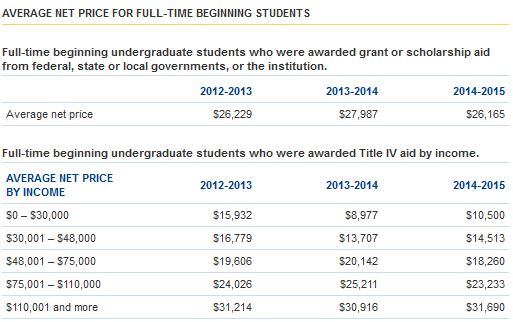 (By KC Raj of KCR Consultants) Since 2016, the number of students from the United States studying in Germany has increased by 17%. Many international students choose to study in Germany to take advantage of its excellent universities and quality of life. However, even more appealing is that students can attend college for free in Germany.
(By KC Raj of KCR Consultants) Since 2016, the number of students from the United States studying in Germany has increased by 17%. Many international students choose to study in Germany to take advantage of its excellent universities and quality of life. However, even more appealing is that students can attend college for free in Germany.
Creating College Lists
394 Colleges Awarding an Average $20,000+ College Scholarships to Freshmen
 (Updated for 2021) For real. There are 394 colleges where the average college scholarship (institutional grant or merit) is over $20,000, an increase of 32 schools compared to last year. What’s the catch? There are only 288 (up from 250 in 2020) schools where 90% or more of freshmen receive institutional grants. Surprisingly enough, there are only 28 schools where 50% or fewer of freshmen receive an institutional grant of $20,000 or more.
(Updated for 2021) For real. There are 394 colleges where the average college scholarship (institutional grant or merit) is over $20,000, an increase of 32 schools compared to last year. What’s the catch? There are only 288 (up from 250 in 2020) schools where 90% or more of freshmen receive institutional grants. Surprisingly enough, there are only 28 schools where 50% or fewer of freshmen receive an institutional grant of $20,000 or more.
COVID-19 Wreck Your College Plans? Here’s the One Thing You Must Do
 The excitement generated by acceptance letters so many high school seniors received before April 1 has morphed into anxiety if not outright panic as families’ finances have been turned upside down. What was an affordable college before COVID-19 may not be any more. Athletes face uncertainty about scholarship availability. And there are students who would just rather stay a little closer to home than when they first created their college list.
The excitement generated by acceptance letters so many high school seniors received before April 1 has morphed into anxiety if not outright panic as families’ finances have been turned upside down. What was an affordable college before COVID-19 may not be any more. Athletes face uncertainty about scholarship availability. And there are students who would just rather stay a little closer to home than when they first created their college list.
So now what?
Before Your Teen Applies to College, Make Sure You’ve had “The Talk”
 As families approach the college planning process, there’s one thing they need to do before anything else and that is have “the talk.” I know, parents have been putting it off because it can be embarrassing. Who wants to discuss such potentially intimate details with their teenagers? Besides, you’re pretty sure the school counselors have covered the topic so there’s no point in having to suffer through the rolling eyes and general awkwardness if you don’t have to.
As families approach the college planning process, there’s one thing they need to do before anything else and that is have “the talk.” I know, parents have been putting it off because it can be embarrassing. Who wants to discuss such potentially intimate details with their teenagers? Besides, you’re pretty sure the school counselors have covered the topic so there’s no point in having to suffer through the rolling eyes and general awkwardness if you don’t have to.
Well, I’m telling you right now that you have to because “the talk” I’m referring to isn’t the “birds and the bees” but something just as important, “The College Money Talk.”
50-50 Highlights: Colleges in Chicago
 Students looking for the big city attractions shouldn’t overlook colleges in Chicago. It’s the 3rd largest city in the United States and has all the expected amenities to go with it. There are 39 colleges with at least 500 full-time undergraduates in the Chicago Core Based Statistical Area (CBSA). While 14 of them are 50-50 colleges, unfortunately only one is a public institution.
Students looking for the big city attractions shouldn’t overlook colleges in Chicago. It’s the 3rd largest city in the United States and has all the expected amenities to go with it. There are 39 colleges with at least 500 full-time undergraduates in the Chicago Core Based Statistical Area (CBSA). While 14 of them are 50-50 colleges, unfortunately only one is a public institution.
50-50 Highlights: Colleges with Cross Registration
 College consortiums offers students the opportunity to take classes at participating colleges through a cross registration system. Students don’t have to go through the admissions and enrollment process at the other college. Through various options, they are allowed to register for a course at an institution on the consortium lists while only paying tuition at their home school. These programs can dramatically expand the courses available to students as well as networking opportunities.
College consortiums offers students the opportunity to take classes at participating colleges through a cross registration system. Students don’t have to go through the admissions and enrollment process at the other college. Through various options, they are allowed to register for a course at an institution on the consortium lists while only paying tuition at their home school. These programs can dramatically expand the courses available to students as well as networking opportunities.
Colleges Most Likely to Meet Financial Need List
 This is a list of over 200 colleges most likely to provide need-based aid (not based on academic merit) to students. I include schools on the list if they meet one of the following requirements:
This is a list of over 200 colleges most likely to provide need-based aid (not based on academic merit) to students. I include schools on the list if they meet one of the following requirements:
- Meet 95% or more of freshman financial need according to the Common Data Set (CDS)
- The Average Net Price for freshman with family incomes of $30,000 or less was $8,000 or less.
College Search Websites: College Navigator
 (You can see an updated evaluation of the College Navigator here.) The College Navigator website is part of the National Center for Education Statistics. They are responsible for collecting all kinds of education related data including that in the Integrated Postsecondary Education Data System (IPEDS). The College Navigator is just the user-friendly way of accessing the IPEDS data. If you don’t like the user-friendly approach, you can access the data directly through the IPEDS Data Center.
(You can see an updated evaluation of the College Navigator here.) The College Navigator website is part of the National Center for Education Statistics. They are responsible for collecting all kinds of education related data including that in the Integrated Postsecondary Education Data System (IPEDS). The College Navigator is just the user-friendly way of accessing the IPEDS data. If you don’t like the user-friendly approach, you can access the data directly through the IPEDS Data Center.
Pros and Cons of Using College Navigator for Creating Your College List
 Why should you use College Navigator as your starting point in creating your college list? Two reasons. The first is that College Navigator is provided by the federal government which is also one of the two major data sources for college search websites and the more reliable of the two. Really. When US News College Rankings wants to check their data, they use the federal government’s Integrated Postsecondary Education Data System (IPEDS) data to check the Common Data Set (CDS).
Why should you use College Navigator as your starting point in creating your college list? Two reasons. The first is that College Navigator is provided by the federal government which is also one of the two major data sources for college search websites and the more reliable of the two. Really. When US News College Rankings wants to check their data, they use the federal government’s Integrated Postsecondary Education Data System (IPEDS) data to check the Common Data Set (CDS).








